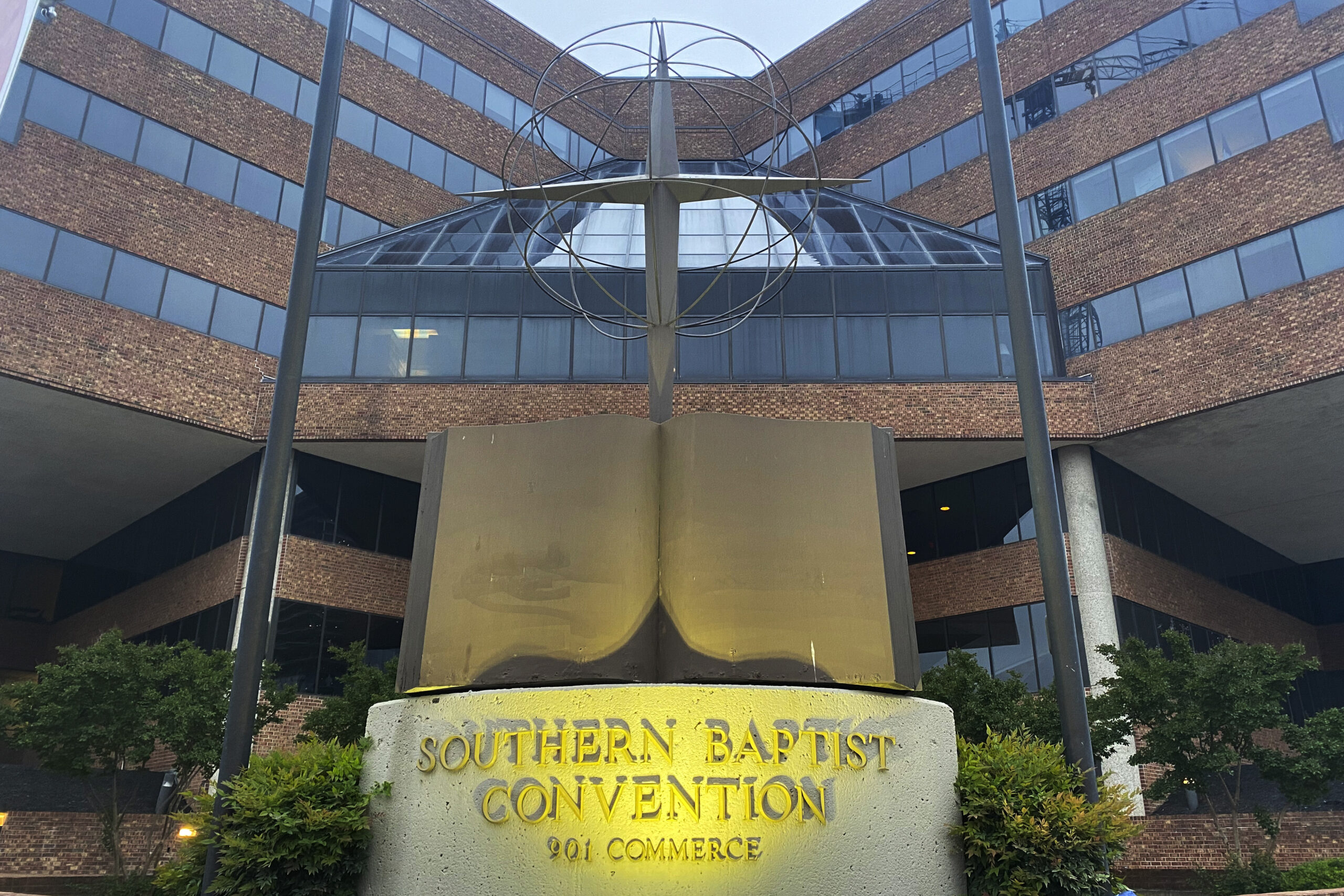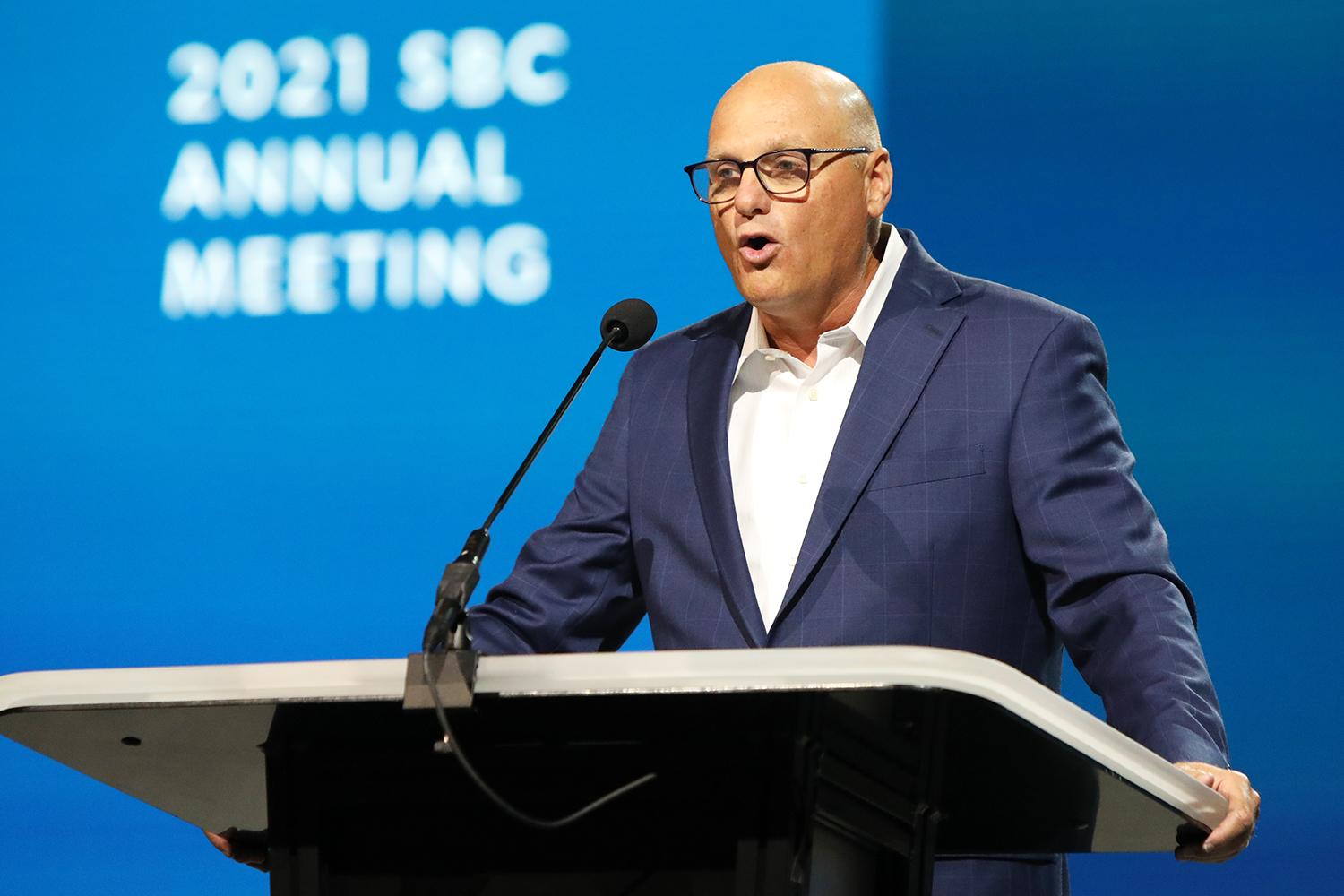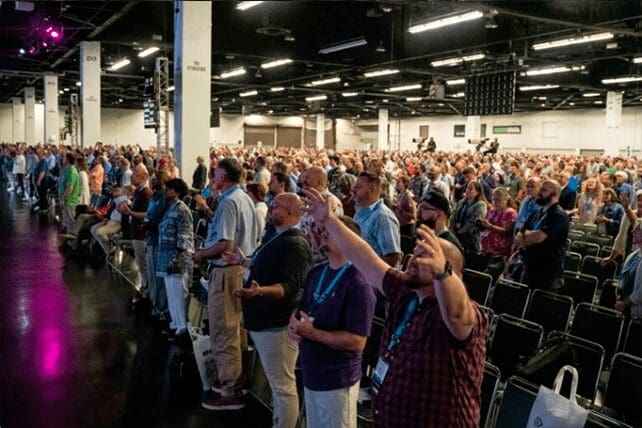“The problem is the unknown,” Mike Bianchi, interim chief financial officer for the Executive Committee, told committee members during last week’s meeting.
When asked about the audit report, Bianchi gave more details about the auditor’s concerns.
“Unsustainable is the notion that the EC lost or used $6 million of liquidity this year and that is not sustainable,” he told committee members.
Most conventionwide ministries, such as missions and seminary education, are funded through the SBC’s Cooperative Program, which pools money from local churches. However, an initial plan to tap Cooperative Program funds to pay for abuse reforms ran into resistance last year. That plan was tabled after Send Relief stepped forward to help subsidize.
Tapping Cooperative Program funds for the reforms would be tricky.

A cross and Bible sculpture stand outside the Southern Baptist Convention headquarters in Nashville, Tennessee, May 24, 2022. (AP Photo/Holly Meyer, File)
In recent years, Southern Baptists have reduced the percentage of Cooperative Program funds that goes to state conventions and to the Executive Committee in order to send more money to missions. Local churches may be reluctant to approve of using funds meant for missions to pay for reforms.
In addition, some pastors have already threatened to rethink their church’s Cooperative Program giving because of how the abuse reforms are being implemented.
Last week, the task force charged with implementing those reforms announced plans to contract with Guidepost Solutions, a consulting firm that previously completed a major SBC abuse investigation, to set up the Ministry Check website. That angered Guidepost critics, who were already suspicious of Guidepost because the firm supports LGBTQ rights.
After the Guidepost announcement, a pair of prominent Florida Baptist pastors — the Rev. Willy Rice of Calvary Baptist Church in Clearwater and the Rev. Heath Lambert of First Baptist Church in Jacksonville — publicly criticized the decision.
Rice, who dropped out of last year’s SBC presidential race after past abuse by one of his church’s deacons became public, said on Twitter that his church was one of the largest givers to the Cooperative Program in the state of Florida. The church will likely reevaluate its giving if Guidepost is hired, Rice tweeted. The Rev. Mike Stone, a Georgia pastor who narrowly lost the 2021 SBC presidential race, said hiring Guidepost “poses an existential threat to our cooperative efforts as a convention.”

Willy Rice, senior pastor of Calvary Church in Clearwater, Florida, delivers the Convention Sermon, June 16, 2021, during the Southern Baptist Convention annual meeting in Nashville, Tennessee. RNS photo by Kit Doyle
This week, the abuse reform implementation task force posted an update on its website to answer questions that arose after the Guidepost announcement. That task force will also make a report to the 2023 SBC annual meeting this summer in New Orleans.
Dale Huntington, pastor of City Life Church in San Diego, said he would support using Cooperative Program funds to pay for abuse reforms.
“I would support it because Jesus calls us to welcome the children,” he said. “I’m not interested in having a great ministry and a millstone around my neck.”
Southern Baptists could also consider tapping other funding sources outside of Cooperative Programs to pay for abuse reforms. The denomination’s national entities, including the two mission boards and six seminaries, control about $1.1 billion in unrestricted funds, according to the 2022 SBC annual book of reports.
Many of those unrestricted assets are used to cover ministry expenses, such as covering health care for missionaries and care for retired missionaries. The SBC also requires the entities to hold several months of operating costs in reserves.
The cost of abuse reforms has been an ongoing controversy in the SBC. A group of former members of the denomination’s Executive Committee tried to limit the scope of the initial Guidepost abuse investigation in 2021. They also tried to control how much of the report became public — out of fear that being transparent would open the SBC to lawsuits and cost millions.
When their side lost, more than a dozen committee members resigned, as did the then-president and CEO of the Executive Committee.
This article originally appeared here.

